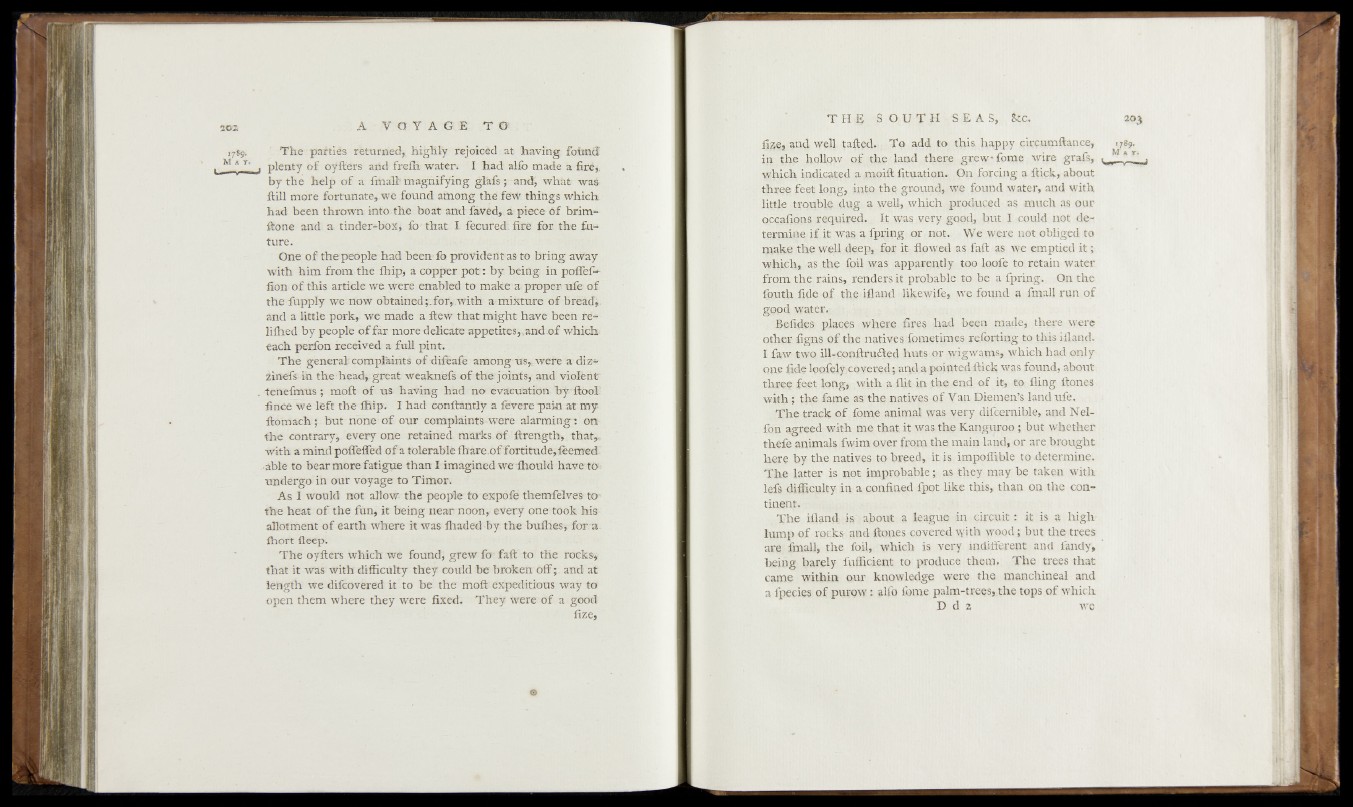
■ ■
A V O Y A G E T O
17*9-
M a t .
Theparties returned, highly rejoiced at having fotacS
j plenty of oyfters and freili waters I had: alfo made a firé*
by the help o f a. feaüb magnifying g&fsy aud; whhtrwa&
ftffl more for tun at e, we fou n d afh<®g thd fdvfe tMhgs whfeh;
had been d»swh into thé beat ankt f^ id ^ i'piece" öf brim;“
ftone and at tindêrdferéi fo'that I feenredt föéë for the Jn»
ture.
One o f thepeople had beemfia proxidedtas to Briugf a#ay
wMi. Mm frota the fhip; a eopjieE potï: byrbeiö^. in pofifefi*
fion of Ads. artMe we Wem embhd tty mateaMproperiTËfo of
the fupply we now obtadned^foi^-witki a mixture ofbread|,,
and a little pork* Wè made a.ftew that might havé’leed té*
liflied by people of far, more delicate appetites,,aEKhof which;
each perfon received a f«fl pint.
'The general! complaints crfdiféafë amo^ ds^'vrefe ^rdizv
iineft iff the head», great weakmsfimf ttt&J oints, aftdfvn&Efeiitr
. teffefmus ; moft Of ns having had no evaet®tabn* bfrffeódl.
fince We left theffiip* I had éonffitótóy a fivere paiff at my
ftdtnachf But none1 of. our complaints-wore alarming^
die coaeRUy*. every one retained ma^s df 'itfength^ thar^
with a mind poifeffed o f a tölerablè fhare.o£ïoititude^ft ema®'
■ able to be» more fatigue than hima^dedw'e,fli©idd :hawe?tn&t3
undergo in our voyage to Timer.
As I would not aHoW thé peopfe tó'espöfëtlrefrrfHveS' ttr'
the heat 00 the fan* it being neasrrnoon» every odertöokbis
allotment o f eairh Whe^ kwas maded-hy the btrihesjFJbErra-
Ihort- fleèp.
The oyfters which we founds grew f<r Taft' to: the rocks#
that it was with difficulty they could be broken o f f a n d at
length we difeovered k to be the moft expeditious way to
open them where they were fixed. They were of a good
fize.
T H E |S O U T H S E A S , Sec. 203
fize, and well taftl|gi To add to this happy circuqaftance, 1189.
irjt the h8h@f$, of the land there grew-fume wipe grafs*
which indicated a moift fituation. On forcing a flick, about
three feet long, into the ground, we found water, and with
little trouble, dug a well, which produced as much as pur
oceafions required. It was.very good, but I could hot determine
if it was a fpring or not. We were not obliged to
rj^ke the weft deep* fofi it dewed as faff as we emptied i t ;
whichi aJ the foil w-as apparently too fopfe to retain water
from dtp, ^ains?„ renders i t . probable to bg}a ipring,., Qn the
fou thfideef. thj* ifiand -hfce^ife we found a fopft run of
good water. , I | a i i ■ /
■ Befides places • where fires had been made, th^fe.were
otheanfipts o f the iiland.
I f»Wi:|spt which had only
one fide le&feiyicpfemk§ a^la-petoeddiff^ wgs founds shook
three feet long* fling ftones
with; the land nfe,
The-track of fon^e anirpai was y g£y difeermble, and Nei-
fon agreed with me. that it was tb^Kangnfoo; but. whether
thffe animds ifwimcwer from tho main landsi°r are brought
here by the natives? to breed» it is impoffible to determine.
Tbp latter is not improbable;- as they may fie taken with
left diffiruky ip a ponfined fpotlike tbfts* than on the com
tinpnt'. (
The ifland; is;>about a league .in circuit : it is a high-
lump of rocks and ftonps-covered with wood; but the trees
are finall, the foil, which is very indifferent and Tandy,
being barely fufficient to produce them. The trees that
came within our knowledge were the manchineal and
a fpeeies of pvurow: alfo fome palm-trees, the tops of which
D d 2 we